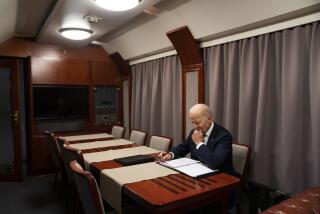President Obama fares better on foreign policy than domestic issues in Gallup poll
- Share via
Americans generally give the president worse marks for his handling of domestic issues than for how he deals with foreign affairs, according to a Gallup poll released Wednesday.
With the 2012 presidential election cycle beginning to pick up momentum, the poll found that Obama was rated worse on key voter issues such as his handling of the economy, the deficit and taxes than how he was seen dealing with foreign issues, especially the political crises in Egypt and Afghanistan.
According to the poll, 48% of Americans approved of how Obama handled foreign affairs compared with 45% who disapproved. Forty-seven percent approved of the president’s handling of Egypt and Afghanistan, but significantly more people disapproved of his handling of Afghanistan, 46%, than of Egypt, 32%.
But the president’s approval rating fell sharply when it came to domestic issues. Only 27% said they approved of how Obama was dealing with the federal deficit while 68% disapproved. On the general economy, 37% said they approved while 60% disapproved.
Obama did better on taxes, with 42% approving; but a majority, 54%, disapproved. Healthcare remained a thorny issue with 40% backing Obama and 56% opposing how he handled the issue.
The split between domestic and international issues is not unexpected and reflects the general American political consensus to back the president on overseas matters despite the political party identification.
For example, Democrats and Republicans widely disagreed over healthcare policy and the economy by approximately 60 points while the partisans were much closer on Egypt and Afghanistan, where the gaps were 32 and 26 points, respectively.
Independents, considered a key group in 2012, were closer to Republicans than to Democrats on healthcare and the economy and even closer to the GOP on the federal budget and taxes. However, on foreign issues, they fell about midway between Republicans and Democrats.
The survey is based on telephone interviews Feb. 2-5, with a random sample of 1,015 adults. The margin of error is plus or minus four percentage points.
More to Read
Get the L.A. Times Politics newsletter
Deeply reported insights into legislation, politics and policy from Sacramento, Washington and beyond. In your inbox twice per week.
You may occasionally receive promotional content from the Los Angeles Times.











